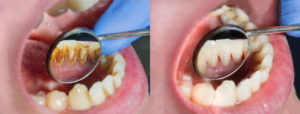Dental Hygiene
Our Moto “Prevention is better than Cure”
The combined efforts of your Team at The National Implant Centre, your Dentist, your Hygienist and most importantly YOU are what are going to determine if you have Healthy Teeth that will last your Lifetime.
Here at The National Implant Centre you have a Team of highly skilled profes-sionals available to you to not only give advice about good oral health as standard but to tailor an individual plan outlining your individual needs to effectively achieve dental heath.
The Team
The Dentist / The Hygienist / The Dental Nurse / The Administration Staff

 A Dental Hygienist is a Dental Professional registered with the Dental Association. Prior to practice a dental hygienist needs to complete a Diploma in Dental Hygiene from an accredited University. Once registered, hygienists work alongside dentists and other dental professionals to provide oral health care.
A Dental Hygienist is a Dental Professional registered with the Dental Association. Prior to practice a dental hygienist needs to complete a Diploma in Dental Hygiene from an accredited University. Once registered, hygienists work alongside dentists and other dental professionals to provide oral health care.
The Role of the Dental Hygienist is to
- provide dental health education about tooth care and diet
- remove plaque and calculus by scaling and polishing teeth
- take impressions and/or dental radiographs of teeth
- apply prophylactic/antibacterial materials, fissure sealants and topical fluorides to help prevent tooth decay
- carry out screening and monitoring procedures
- treat and help to prevent gum disease
- ensure that sterile conditions are maintained
- offer advice and encouragement to patients
- work closely with and under the instruction of dentists
- use a range of dental instruments
- keep up to date with new developments within the profession and maintaining patient dental records
The main cause of periodontal (gum) disease is plaque, but other factors affect the health of your gums.
Age
In ageing populations, the prevalence of periodontitis in the European population is 70-85 percent of the population aged 60 to 65 years of Age (Eke Pt et al 2012, Holt-freter Bet al., 2010)
Smoking/Tobacco Use
Tobacco use is linked with many serious illnesses such as cancer, lung disease and heart disease, as well as numerous other health problems. Tobacco users also are at increased risk for periodontal disease. Studies have shown that tobacco use may be one of the most significant risk factors in the development and progression of periodontal disease.
Genetics
Research has indicated that some people may be genetically susceptible to gum disease. Despite aggressive oral care habits, these people may be more likely to develop periodontal disease. Identifying these people with a genetic test before they even show signs of the disease and getting them into early intervention treat-ment may help them keep their teeth for a lifetime.
Stress
Stress is linked to many serious conditions such as hypertension, cancer, and nu-merous other health problems. Stress also is a risk factor for periodontal disease. Research demonstrates that stress can make it more difficult for the body to fight off infection, including periodontal diseases.
Medications
Some drugs, such as oral contraceptives, anti-depressants, and certain heart medi-cines, can affect your oral health. Just as you notify your pharmacist and other health care providers of all medicines you are taking and any changes in your overall health, you should also inform your dental care provider.
Clenching or Grinding Your Teeth
Clenching or grinding your teeth can put excess force on the supporting tissues of the teeth and could speed up the rate at which these periodontal tissues are de-stroyed.
Other Systemic Diseases
Other systemic diseases that interfere with the body’s inflammatory system may worsen the condition of the gums. These include cardiovascular disease, diabetes, and rheumatoid arthritis.
Poor Nutrition and Obesity
A diet low in important nutrients can compromise the body’s immune system and make it harder for the body to fight off infection. Because periodontal disease be-gins as an infection, poor nutrition can worsen the condition of your gums. In addi-tion, research has shown that obesity may increase the risk of periodontal disease.
Poor tooth alignment
Crooked teeth or overcrowding.
Dental work that fits poorly in the mouth and is hard to reach with Oral hygiene aids.
Dental Prosthesis (e.g. Fillings, bridges, crowns, implants) that may be difficult to clean.
Pregnancy
During pregnancy, increased levels of the hormone, progesterone, cause an in-creased response to plaque bacteria which can lead to gingivitis.
- Bleeding or swollen gums
- Severe tooth or gum pain
- Pus along your gum line
Prior to your first Visit – PLEASE NOTE THE FOLLOWING
- If you recently have had x rays at another practice (within the last 2 years) please try and get a copy of these x rays. If this is not possible then we can take an x ray here as part of your dental screening.
- As part of your hygiene assessment we need to provide you with the best Oral hygiene plan to suit your individual needs. This includes the best Oral hygiene Aids that will suit your needs. Therefore please make note of what you use before presenting to your hygienist and she can tailor this to suit your individual needs. E.g. Toothbrush, inter dental aids ( Floss, brushes, picks)
The Dentist will give you a Full Dental Health check which includes
- Oral Cancer Screening
- Restorative evaluation (establish what dental treatment needs to be done) This would include a Tailored treatment plan outlining your individual needs e.g. Fillings & tooth replacement plan ( crowns, bridges, implants)
- Gum health evaluation. Determine and advise if you have Early signs of Gum Disease- (Gingivitis / Bleeding gums) or more advanced Gum Disease – Periodontitis Destruction of the periodontium (supporting structures of the teeth gums and bone)
- Outline a treatment plan and explain in detail what steps you need to take and what appointment you need to book.
 The Hygienist will then provide you with
The Hygienist will then provide you with
- Oral hygiene advice and demonstration e.g. brushing technique and Best technique for cleaning between your teeth.
- Diet analysis
- Initial Gross Scale and Polish (Removal of Plaque/Tartar and polish the Crowns of your teeth) and Gum health screening (Pocket charting)
- Specific care plan suited to your individual needs for maintenance of any restorative prosthetics or the ongoing care of any Implants that have been placed by our highly experienced Implantologist.
- The hygienist will then tailor an Individual Homecare advice plan. If all well, you will be put on a maintenance programme for regular cleaning to maintain health. If not, you may need to return for the following
This appointment involves removal of Tartar and plaque that has reached below the gum line where a toothbrush cannot reach.
This can be done with Local anaesthetic if necessary.
This is the appointment required to maintain Health. This can vary according to individual needs. The hygienist will explain at your Initial appointment what is required for this appointment and any further appointments for cleaning your teeth.
